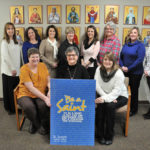By Anne Marie Amacher
The Catholic Messenger
DAVENPORT — As Catholics, we are called to participate in the political life of our country. The Knights of Columbus note, “This can be difficult at times because our beliefs are often misunderstood and unpopular.” Laws and regulations can be “contrary to our beliefs.”

So the national Knights of Columbus council encouraged its local councils throughout the United States to have students in grades 8-12 write on the topic of religious freedom.
Davenport’s St. Paul the Apostle Knights of Columbus Council took on the effort to “get our youths thinking critically about their Catholic faith and how they can apply it to the important issues of our time. And of course to recognize and reward motivated students who put in the effort to enter the contest,” said Tom Heinold, St. Paul’s deputy grand knight.
The parish’s KC council coordinated with other KC councils in the area to offer the contest to parochial schools in the Davenport-Bettendorf area, he noted. All schools were contacted about the essay contest opportunity to be done as either a class assignment or optional writing.
Knights Steve Baldry, Jim Herrington and Heinold graded the essays. First place was awarded to Emily Merritt of Assumption High School in Davenport. Second place went to eighth-grader Zach Wemhoff of John F. Kennedy Catholic School in Davenport.
Emily said she entered “because I always like a challenge and I like to write papers … I thought the topic was interesting because religious freedom isn’t talked about much or discussed in school because we are fortunate enough to have rights of our own. A lot of my paper I based off opinion, but I did have to look some information up.”
She was surprised to learn she was the winner because she figured there would be “much better papers than mine.” In her essay, Emily wrote, “A reason why religious freedom is important is because it gives people hope. People can look to God for guidance and ask for strength….”
During a visit he made to one of the Catholic schools, Heinold said he learned that students think that freedom means “the ability to do whatever I want.”
He added, “I tried to teach them that it’s not quite that simple, unless ‘whatever you want’ is always in accordance with God’s will for you. I used this example: If you want to eat your dessert before dinner and your mom and dad don’t let you, or if you want to sit on the couch all weekend and play video games and mom and dad make you go outside and play, is that really limiting your freedom? Not really, because if you eat nothing but junk or if you never get any exercise, then you’ll really be limited in what you can do because you won’t be healthy or happy. Your moms and dads want you to be healthy and happy because they love you very much, and so it is with God. When we do things that aren’t good for us, things that are not in line with God’s plan for us or things that prevent us from being the person that God is calling us to be, then we are really limiting our own freedom. So, true freedom is the ability to live a life of love, health and happiness consistent with God’s will.”











